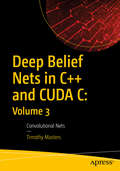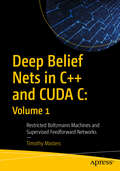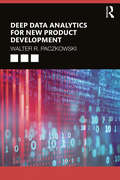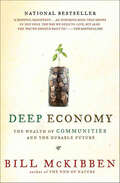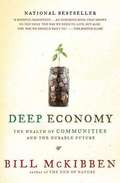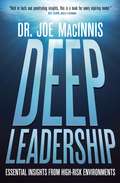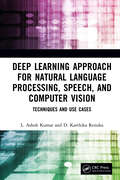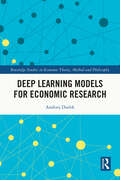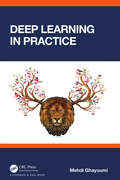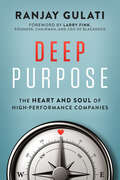- Table View
- List View
Deena Katz's Complete Guide to Practice Management: Tips, Tools, and Templates for the Financial Adviser (Bloomberg Financial #64)
by Deena B. KatzDeena B. Katz, CFP, a preeminent authority on practice management and an internationally recognized financial adviser, presents a comprehensive guide to running a professional financial planning practice. To create this book, Katz updated, revised, and combined her two acclaimed books Deena Katz on Practice Management (1999) and Deena Katz's Tools and Templates for Your Practice (2001). In this newly expanded volume, she presents the essentials on how to help a practice thrive side by side with the tools and templates needed for the everyday operation of your firm. This new volume offers guidance on practice-management issues: setting up an office systems and technology administration and staffing marketing growing as the market changes hanging on to clients for the long term succession planning when the time comes This comprehensive resource provides sample forms, worksheets, templates, letters, brochures, and collateral materials developed and refined by top wealth managers and planners. From keeping the business running well by designing dynamic collateral material, to considering plans for retirement, Deena B. Katz guides advisers through every challenge a financial planning business will face.
Deep Belief Nets in C++ and CUDA C: Convolutional Nets
by Timothy MastersDiscover the essential building blocks of a common and powerful form of deep belief network: convolutional nets. This book shows you how the structure of these elegant models is much closer to that of human brains than traditional neural networks; they have a ‘thought process’ that is capable of learning abstract concepts built from simpler primitives. These models are especially useful for image processing applications. At each step Deep Belief Nets in C++ and CUDA C: Volume 3 presents intuitive motivation, a summary of the most important equations relevant to the topic, and concludes with highly commented code for threaded computation on modern CPUs as well as massive parallel processing on computers with CUDA-capable video display cards. Source code for all routines presented in the book, and the executable CONVNET program which implements these algorithms, are available for free download.What You Will LearnDiscover convolutional nets and how to use themBuild deep feedforward nets using locally connected layers, pooling layers, and softmax outputsMaster the various programming algorithms requiredCarry out multi-threaded gradient computations and memory allocations for this threadingWork with CUDA code implementations of all core computations, including layer activations and gradient calculationsMake use of the CONVNET program and manual to explore convolutional nets and case studiesWho This Book Is ForThose who have at least a basic knowledge of neural networks and some prior programming experience, although some C++ and CUDA C is recommended.
Deep Belief Nets in C++ and CUDA C: Restricted Boltzmann Machines And Supervised Feedforward Networks (Deep Belief Nets In C++ And Cuda C Ser.)
by Timothy MastersDiscover the essential building blocks of the most common forms of deep belief networks. At each step this book provides intuitive motivation, a summary of the most important equations relevant to the topic, and concludes with highly commented code for threaded computation on modern CPUs as well as massive parallel processing on computers with CUDA-capable video display cards. The first of three in a series on C++ and CUDA C deep learning and belief nets, Deep Belief Nets in C++ and CUDA C: Volume 1 shows you how the structure of these elegant models is much closer to that of human brains than traditional neural networks; they have a thought process that is capable of learning abstract concepts built from simpler primitives. As such, you’ll see that a typical deep belief net can learn to recognize complex patterns by optimizing millions of parameters, yet this model can still be resistant to overfitting. All the routines and algorithms presented in the book are available in the code download, which also contains some libraries of related routines. What You Will LearnEmploy deep learning using C++ and CUDA CWork with supervised feedforward networks Implement restricted Boltzmann machines Use generative samplingsDiscover why these are importantWho This Book Is ForThose who have at least a basic knowledge of neural networks and some prior programming experience, although some C++ and CUDA C is recommended.
Deep Data Analytics for New Product Development
by Walter R. PaczkowskiThis book presents and develops the deep data analytics for providing the information needed for successful new product development. Deep Data Analytics for New Product Development has a simple theme: information about what customers need and want must be extracted from data to effectively guide new product decisions regarding concept development, design, pricing, and marketing. The benefits of reading this book are twofold. The first is an understanding of the stages of a new product development process from ideation through launching and tracking, each supported by information about customers. The second benefit is an understanding of the deep data analytics for extracting that information from data. These analytics, drawn from the statistics, econometrics, market research, and machine learning spaces, are developed in detail and illustrated at each stage of the process with simulated data. The stages of new product development and the supporting deep data analytics at each stage are not presented in isolation of each other, but are presented as a synergistic whole. This book is recommended reading for analysts involved in new product development. Readers with an analytical bent or who want to develop analytical expertise would also greatly benefit from reading this book, as well as students in business programs.
Deep Economy: The Wealth of Communities and the Durable Future
by Bill McKibbenThe bestselling author of The End of Nature issues an impassioned call to arms for an economy that creates community and ennobles our livesIn this powerful and provocative manifesto, Bill McKibben offers the biggest challenge in a generation to the prevailing view of our economy. For the first time in human history, he observes, "more" is no longer synonymous with "better"—indeed, for many of us, they have become almost opposites. McKibben puts forward a new way to think about the things we buy, the food we eat, the energy we use, and the money that pays for it all. Our purchases, he says, need not be at odds with the things we truly value.McKibben's animating idea is that we need to move beyond "growth" as the paramount economic ideal and pursue prosperity in a more local direction, with cities, suburbs, and regions producing more of their own food, generating more of their own energy, and even creating more of their own culture and entertainment. He shows this concept blossoming around the world with striking results, from the burgeoning economies of India and China to the more mature societies of Europe and New England. For those who worry about environmental threats, he offers a route out of the worst of those problems; for those who wonder if there isn't something more to life than buying, he provides the insight to think about one's life as an individual and as a member of a larger community.McKibben offers a realistic, if challenging, scenario for a hopeful future. Deep Economy makes the compelling case that the more we nurture the essential humanity of our economy, the more we will recapture our own.
Deep Economy: The Wealth of Communities and the Durable Future
by Bill MckibbenPopular environmental writer McKibben shows how global warming and other environmental problems are related to the concepts and practices of consumer and corporate capitalism, and suggests how to move beyond the bind.
Deep Energy Retrofit—A Guide for Decision Makers (SpringerBriefs in Applied Sciences and Technology)
by Rüdiger Lohse Alexander ZhivovMany governments worldwide are setting more stringent targets for reductions in energy use in government/public buildings. Buildings constructed more than 10 years ago account for a major share of energy used by the building stock. However, the funding and “know-how” (applied knowledge) available for owner-directed energy retrofit projects has not kept pace with new requirements. With typical retrofit projects, reduction of energy use varies between 10 and 20%, while actual executed renovation projects show that energy use reduction can exceed 50%, and can cost-effectively achieve the Passive House standard or even approach net zero-energy status (EBC Annex 61 2017a, Hermelink and Müller 2010; NBI 2014; RICS 2013; Shonder and Nasseri 2015; Miller and Higgins 2015; Emmerich et al. 2011).Building energy efficiency (EE) ranks first in approaches with resource efficiency potential with a total resource benefit of approximately $700 billion until 2030. EE is by far the cheapest way to cut CO2 emissions (McKinsey 2011, IPCC 2007). However, according to an IEA study (IEA 2014a), more than 80% of savings potential in building sector remains untapped. Thus, the share of deployed EE in the building sector is lower than in the Industry, Transport, and Energy generation sectors. Estimates for the deep renovation potentials show: €600-900bn investment potential, €1000-1300bn savings potential, 70% energy-saving potential, and 90% CO2 reduction potential.
Deep Energy Retrofit—Case Studies: Business and Technical Concepts for Deep Energy Retrofit of Public Buildings; Energy in Buildings and Communities Programme; Annex 61, Subtask A
by Alexander Zhivov Ruediger Lohse Ove C. MørckThis book describes results of research conducted with the goal of providing a framework, selected tools, and guidelines to significantly reduce energy use (by more than 50%) in government and public buildings. The scope of the book is limited to public buildings that were constructed before the 1980s with low internal loads (e.g., office buildings, dormitories, barracks, public housing, and educational buildings) and that were undergoing major renovation. The book contains description and analysis of 26 well-documented case studies from Europe (Austria, Denmark, Estonia, Germany, Ireland, Latvia, Montenegro, The Netherlands, and the UK) and the USA. After these data were collected, the case studies were analyzed with respect to energy use (before and after renovation), reasons for undertaking the renovation, co-benefits achieved, resulting cost-effectiveness, and the business models followed. Finally, “lessons learned” were compiled and compared.Deep Energy Retrofit (DER) is a major building renovation project in which site energy use intensity (including plug loads) has been reduced by at least 50% from the pre-renovation baseline with a corresponding improvement in indoor environmental quality and comfort. Lessons learned from the case studies and experiences of the team clearly indicate that DER can be achieved with the application of “bundles” of a limited number of core technologies readily available on the market. Specific characteristics of some of these core technology bundles generally depend on the technologies available on an individual nation’s market, on the minimum requirements of national standards, and on economics (as determined by a life cycle cost [LCC] analysis).
Deep IV in Law: Appellate Decisions and Texts Impact Sentencing in Trial Courts (Elements in Law, Economics and Politics)
by Xinyue Zhang Zhe Huang Ruofan Wang Daniel L. ChenDo US Circuit Courts' decisions on criminal appeals influence sentence lengths imposed by US District Courts? This Element explores the use of high-dimensional instrumental variables to estimate this causal relationship. Using judge characteristics as instruments, this Element implements two-stage models on court sentencing data for the years 1991 through 2013. This Element finds that Democratic, Jewish judges tend to favor criminal defendants, while Catholic judges tend to rule against them. This Element also finds from experiments that prosecutors backlash to Circuit Court rulings while District Court judges comply. Methodologically, this Element demonstrates the applicability of deep instrumental variables to legal data.
Deep Integration in Latin American Trade Agreements (Routledge Studies in Latin American Politics)
by Ninfa M. Fuentes-SosaTrade agreements have uncontested relevance as essential instruments governing international trade, yet little attention has been directed towards explaining differences in their content. Deep Integration in Latin American Trade Agreements analyzes the structure, nature, and characteristics of deep integration in trade agreements established by Latin American countries after the crises of 1982 and until 2020 with their regional and extra-regional partners. Ninfa M. Fuentes-Sosa argues that deep integration can be disaggregated into its institutional, operative, and horizontal dimensions (which differ regarding their functions and application level). Empirically, she demonstrates that trade provisions can be mapped, measured, and allocated into their corresponding dimension, providing an understanding of the deep integration structure in Latin America. She claims that the current structure poses challenges for deepening regionalism at a broad scale. Countries working on specific areas over time could diminish obstacles that have prevented them from achieving deeper trade integration. Providing an operational definition and measures of deep integration, this book will be of great interest to scholars, graduate students, and policymakers working in the field of international political economy, trade, and trade politics.
Deep Integration, Global Firms, and Technology Spillovers (Advances in Japanese Business and Economics #26)
by Xingyuan Zhang Naoto Jinji Shoji HarunaThis open access book explores the impact of deep regional economic integration on spillovers of knowledge and technology across countries. Deep integration through signing deep regional trade agreements (DRTAs), which cover various policy areas in addition to tariff reductions, may or may not facilitate technology spillovers among their signatories. To understand the mechanism of the impact of deep integration on technology spillovers, this book starts by analyzing the behavior of global firms. Factors that affect global firms’ activities, such as export, foreign direct investment (FDI), offshore outsourcing, are examined. Micro data on Japanese firms are employed for the analysis. Then, the relationships between bilateral trade patterns and technology spillovers and between types of FDI and technology spillovers are investigated in detail. Patent citation data are used to measure technology spillovers. Finally, the impact of DRTAs on international technology spillovers is analyzed. This book is highly recommended to readers who are interested in the effects of deep regional integration, including academic scholars, policymakers, and graduate students.
Deep Leadership: Essential Insights from High-Risk Environments
by Joe MacinnisIn this new twist on a topic of perennial interest, Joe MacInnis shows how the leadership traits forged in extraordinary circumstances are transferrable to our everyday lives. Simply put, this is a handbook for building character. Some people are born leaders. The rest of us find ourselves in positions where leadership is required. Self-described "accidental leader" Dr. Joe MacInnis found himself in such a situation: deep beneath the ice of the Arctic Ocean. Starting with his undersea explorations, this physician, scientist, author and motivational speaker shares an accessible--and obtainable--list of leadership traits inspired by his own journey and the icons he's learned from over the years. Deep Leadership is an eminently digestible book with short lessons and anecdotes. Think Rework meets Iacocca. Its centre is the author's 12 "Essential Traits of Leadership": Cool Competence, Powerful Presentations, Physical Toughness, Hot-Zone Humour, Mental Resilience, Strategic Imagination, High-Empathy Communication, Enduring Trust, Fierce Ingenuity, Team Genius, Resolute Courage and Warrior's Honour. Each trait is communicated with an anecdote from MacInnis's experience, making it totally memorable. MacInnis also gives the reader a primer to navigate his or her own path toward leadership, including such practices as keeping a journal, building a library, and finding mentors.
Deep Learning Approach for Natural Language Processing, Speech, and Computer Vision: Techniques and Use Cases
by L. Ashok Kumar D. Karthika RenukaDeep Learning Approach for Natural Language Processing, Speech, and Computer Vision provides an overview of general deep learning methodology and its applications of natural language processing (NLP), speech, and computer vision tasks. It simplifies and presents the concepts of deep learning in a comprehensive manner, with suitable, full-fledged examples of deep learning models, with an aim to bridge the gap between the theoretical and the applications using case studies with code, experiments, and supporting analysis. Features: Covers latest developments in deep learning techniques as applied to audio analysis, computer vision, and natural language processing. Introduces contemporary applications of deep learning techniques as applied to audio, textual, and visual processing. Discovers deep learning frameworks and libraries for NLP, speech, and computer vision in Python. Gives insights into using the tools and libraries in Python for real-world applications. Provides easily accessible tutorials and real-world case studies with code to provide hands-on experience. This book is aimed at researchers and graduate students in computer engineering, image, speech, and text processing.
Deep Learning Models for Economic Research (Routledge Studies in Economic Theory, Method and Philosophy)
by Andrzej DudekIn today’s data-driven world, the ability to make sense of complex, high-dimensional datasets is crucial for economists and data scientists. Traditional quantitative methods, while powerful, often struggle to keep up with the complexities of modern economic challenges. This book bridges this gap, integrating cutting-edge machine learning techniques with established economic analysis to provide new, more accurate insights.The book offers a comprehensive approach to understanding and applying neural networks and deep learning models in the context of conducting economic research. It starts by laying the groundwork with essential quantitative methods such as cluster analysis, regression, and factor analysis, then demonstrates how these can be enhanced with deep learning techniques like recurrent neural networks (RNNs), convolutional neural networks (CNNs), and transformers. By guiding readers through real-world examples, complete with Python code and access to datasets, it showcases the practical benefits of neural networks in solving complex economic problems, such as fraud detection, sentiment analysis, stock price forecasting, and inflation factor analysis. Importantly, the book also addresses critical concerns about the “black box” nature of deep learning, offering interpretability techniques like Local Interpretable Model-agnostic Explanations (LIME) and SHapley Additive exPlanations (SHAP) to demystify model predictions.The book is essential reading for economists, data scientists, and professionals looking to deepen their understanding of AI’s role in economic modeling. It is also an accessible resource for non-experts interested in how machine learning is transforming economic analysis.
Deep Learning and Scientific Computing with R torch (Chapman & Hall/CRC The R Series)
by Sigrid Keydanatorch is an R port of PyTorch, one of the two most-employed deep learning frameworks in industry and research. It is also an excellent tool to use in scientific computations. It is written entirely in R and C/C++. Though still "young" as a project, R torch already has a vibrant community of users and developers. Experience shows that torch users come from a broad range of different backgrounds. This book aims to be useful to (almost) everyone. Globally speaking, its purposes are threefold: - Provide a thorough introduction to torch basics – both by carefully explaining underlying concepts and ideas, and showing enough examples for the reader to become "fluent" in torch. - Again with a focus on conceptual explanation, show how to use torch in deep-learning applications, ranging from image recognition over time series prediction to audio classification. - Provide a concepts-first, reader-friendly introduction to selected scientific-computation topics (namely, matrix computations, the Discrete Fourier Transform, and wavelets), all accompanied by torch code you can play with. Deep Learning and Scientific Computing with R torch is written with first-hand technical expertise and in an engaging, fun-to-read way.
Deep Learning for Biology: Harness AI to Solve Real-World Biology Problems
by Charles Ravarani Natasha LatyshevaBridge the gap between modern machine learning and real-world biology with this practical, project-driven guide. Whether your background is in biology, software engineering, or data science, Deep Learning for Biology gives you the tools to develop deep learning models for tackling a wide range of biological problems. Authors Charles Ravarani and Natasha Latysheva guide you through hands-on projects applying deep learning to domains like DNA, proteins, biological networks, medical images, and microscopy. Each chapter is a self-contained mini-project, with step-by-step explanations that teach you how to train and interpret deep learning models using real biological data. Build models for real-world biological problems such as gene regulation, protein function prediction, drug interactions, and cancer detection Apply architectures like convolutional neural networks, transformers, graph neural networks, and autoencoders Use Python and interactive notebooks for hands-on learning Build problem-solving intuition that generalizes beyond biology Whether you’re exploring new methods, transitioning into computational biology, or looking to make sense of machine learning in your field, this book offers a clear and approachable path forward.
Deep Learning for Finance: Creating Machine & Deep Learning Models for Trading in Python
by Sofien KaabarDeep learning is rapidly gaining momentum in the world of finance and trading. But for many professional traders, this sophisticated field has a reputation for being complex and difficult. This hands-on guide teaches you how to develop a deep learning trading model from scratch using Python, and it also helps you create and backtest trading algorithms based on machine learning and reinforcement learning.Sofien Kaabar—financial author, trading consultant, and institutional market strategist—introduces deep learning strategies that combine technical and quantitative analyses. By fusing deep learning concepts with technical analysis, this unique book presents outside-the-box ideas in the world of financial trading. This A-Z guide also includes a full introduction to technical analysis, evaluating machine learning algorithms, and algorithm optimization.Understand and create machine learning and deep learning modelsExplore the details behind reinforcement learning and see how it's used in time seriesUnderstand how to interpret performance evaluation metricsExamine technical analysis and learn how it works in financial marketsCreate technical indicators in Python and combine them with ML models for optimizationEvaluate the models' profitability and predictability to understand their limitations and potential
Deep Learning for Power System Applications: Case Studies Linking Artificial Intelligence and Power Systems (Power Electronics and Power Systems)
by Yan Du Fangxing LiThis book provides readers with an in-depth review of deep learning-based techniques and discusses how they can benefit power system applications. Representative case studies of deep learning techniques in power systems are investigated and discussed, including convolutional neural networks (CNN) for power system security screening and cascading failure assessment, deep neural networks (DNN) for demand response management, and deep reinforcement learning (deep RL) for heating, ventilation, and air conditioning (HVAC) control.Deep Learning for Power System Applications: Case Studies Linking Artificial Intelligence and Power Systems is an ideal resource for professors, students, and industrial and government researchers in power systems, as well as practicing engineers and AI researchers.Provides a history of AI in power grid operation and planning;Introduces deep learning algorithms and applications in power systems;Includes several representative case studies.
Deep Learning in Biomedical and Health Informatics: Current Applications and Possibilities (Emerging Trends in Biomedical Technologies and Health informatics)
by Ajith Abraham Ana Madureira M. A. Jabbar Sanju Tiwari Onur DoganThis book provides a proficient guide on the relationship between Artificial Intelligence (AI) and healthcare and how AI is changing all aspects of the healthcare industry. It also covers how deep learning will help in diagnosis and the prediction of disease spread. The editors present a comprehensive review of research applying deep learning in health informatics in the fields of medical imaging, electronic health records, genomics, and sensing, and highlights various challenges in applying deep learning in health care. This book also includes applications and case studies across all areas of AI in healthcare data. The editors also aim to provide new theories, techniques, developments, and applications of deep learning, and to solve emerging problems in healthcare and other domains. This book is intended for computer scientists, biomedical engineers, and healthcare professionals researching and developing deep learning techniques. In short, the volume : Discusses the relationship between AI and healthcare, and how AI is changing the health care industry. Considers uses of deep learning in diagnosis and prediction of disease spread. Presents a comprehensive review of research applying deep learning in health informatics across multiple fields. Highlights challenges in applying deep learning in the field. Promotes research in ddeep llearning application in understanding the biomedical process. Dr.. M.A. Jabbar is a professor and Head of the Department AI&ML, Vardhaman College of Engineering, Hyderabad, Telangana, India. Prof. (Dr.) Ajith Abraham is the Director of Machine Intelligence Research Labs (MIR Labs), Auburn, Washington, USA. Dr.. Onur Dogan is an assistant professor at İzmir Bakırçay University, Turkey. Prof. Dr. Ana Madureira is the Director of The Interdisciplinary Studies Research Center at Instituto Superior de Engenharia do Porto (ISEP), Portugal. Dr.. Sanju Tiwari is a senior researcher at Universidad Autonoma de Tamaulipas, Mexico.
Deep Learning in Practice
by Mehdi GhayoumiDeep Learning in Practice helps you learn how to develop and optimize a model for your projects using Deep Learning (DL) methods and architectures. Key features: Demonstrates a quick review on Python, NumPy, and TensorFlow fundamentals. Explains and provides examples of deploying TensorFlow and Keras in several projects. Explains the fundamentals of Artificial Neural Networks (ANNs). Presents several examples and applications of ANNs. Learning the most popular DL algorithms features. Explains and provides examples for the DL algorithms that are presented in this book. Analyzes the DL network’s parameter and hyperparameters. Reviews state-of-the-art DL examples. Necessary and main steps for DL modeling. Implements a Virtual Assistant Robot (VAR) using DL methods. Necessary and fundamental information to choose a proper DL algorithm. Gives instructions to learn how to optimize your DL model IN PRACTICE. This book is useful for undergraduate and graduate students, as well as practitioners in industry and academia. It will serve as a useful reference for learning deep learning fundamentals and implementing a deep learning model for any project, step by step.
Deep Learning in Quantitative Trading (Elements in Quantitative Finance)
by Zihao Zhang Stefan ZohrenThis Element provides a comprehensive guide to deep learning in quantitative trading, merging foundational theory with hands-on applications. It is organized into two parts. The first part introduces the fundamentals of financial time-series and supervised learning, exploring various network architectures, from feedforward to state-of-the-art. To ensure robustness and mitigate overfitting on complex real-world data, a complete workflow is presented, from initial data analysis to cross-validation techniques tailored to financial data. Building on this, the second part applies deep learning methods to a range of financial tasks. The authors demonstrate how deep learning models can enhance both time-series and cross-sectional momentum trading strategies, generate predictive signals, and be formulated as an end-to-end framework for portfolio optimization. Applications include a mixture of data from daily data to high-frequency microstructure data for a variety of asset classes. Throughout, they include illustrative code examples and provide a dedicated GitHub repository with detailed implementations.
Deep Listening: Transform Your Relationships with Family, Friends, and Foes
by Emily Kasriel“If you’ve ever felt like two ears aren’t enough, this book is for you. Deep Listening reveals how we can improve at hearing others—and helping them hear us too.” —Adam Grant, #1 New York Times bestselling author of Think Again and Hidden Potential, and host of the podcast Re:ThinkingWhy do so many conversations leave us feeling unheard and disconnected? In Deep Listening, acclaimed BBC journalist, accredited executive coach, and mediator Emily Kasriel argues that it’s because we've forgotten how to truly listen.Distracted by our own agenda, we so often hear without understanding, impatiently waiting for our turn to speak. In this exploration of transformational listening, Kasriel shows how shifting from surface-level exchanges to Deep Listening can enrich our relationships as friends, parents, and partners, enhance our effectiveness as leaders, and strengthen the fabric of our communities. At a time when divisions within communities, organizations, and families are often a source of profound pain, this book offers inspiration and practical guidance on how we can better listen to each other, even when we fiercely disagree.Drawing on scientific studies, new research, and powerful stories from legendary listeners in politics, business, and the arts, Kasriel unveils her simple yet transformative eight-step approach. With Deep Listening as your guide, you’ll learn to become a better family member, friend, co-worker and citizen.At once a practical guide and a heartfelt manifesto, this groundbreaking book challenges us to rethink our approach to listening and in doing so, transform our lives from the inside out. Whether readers seek to strengthen their empathy, boost their performance at work, or foster genuine understanding across cultural, political, and generational divides, Deep Listening provides the tools and inspiration to unlock the power of lasting, meaningful connections.
Deep Medicine: How Artificial Intelligence Can Make Healthcare Human Again
by Eric TopolOne of America's top doctors reveals how AI will empower physicians and revolutionize patient care Medicine has become inhuman, to disastrous effect. The doctor-patient relationship--the heart of medicine--is broken: doctors are too distracted and overwhelmed to truly connect with their patients, and medical errors and misdiagnoses abound. In Deep Medicine, leading physician Eric Topol reveals how artificial intelligence can help. AI has the potential to transform everything doctors do, from notetaking and medical scans to diagnosis and treatment, greatly cutting down the cost of medicine and reducing human mortality. By freeing physicians from the tasks that interfere with human connection, AI will create space for the real healing that takes place between a doctor who can listen and a patient who needs to be heard.Innovative, provocative, and hopeful, Deep Medicine shows us how the awesome power of AI can make medicine better, for all the humans involved.
Deep Metaphors at Work: A Strategy for Workable Wondering-Understanding the Minds of Consumers
by Gerald Zaltman Lindsay ZaltmanIf you want to overcome the deficit prevalent in consumer marketing and evidenced by failed product launches, ineffective marketing communications, and me-too research and development, you must learn to identify and engage the deep metaphors that govern the minds of consumers.
Deep Purpose: The Heart and Soul of High-Performance Companies
by Ranjay GulatiA distinguished Harvard Business School professor offers a compelling reassessment and defense of purpose as a management ethos, documenting the vast performance gains and social benefits that become possible when firms manage to get purpose right.Few business topics have aroused more skepticism in recent years than the notion of corporate purpose, and for good reason. Too many companies deploy purpose, or a reason for being, as a promotional vehicle to make themselves feel virtuous and to look good to the outside world. Some have only foggy ideas about what purpose is and conflate it with strategy and other concepts like “mission,” “vision,” and “values.” Even well-intentioned leaders don’t understand purpose’s full potential and engage half-heartedly and superficially with it. Outsiders spot this and become cynical about companies and the broader capitalist endeavor.Having conducted extensive field research, Ranjay Gulati reveals the fatal mistakes leaders unwittingly make when attempting to implement a reason for being. Moreover, he shows how companies can embed purpose much more deeply than they currently do, delivering impressive performance benefits that reward customers, suppliers, employees, shareholders, and communities alike. To get purpose right, leaders must fundamentally change not only how they execute it but also how they conceive of and relate to it. They must practice what Gulati calls deep purpose, furthering each organization’s reason for being more intensely, thoughtfully, and comprehensively than ever before.In this authoritative, accessible, and inspiring guide, Gulati takes readers inside some of the world’s most purposeful companies to understand the secrets to their successes. He explores how leaders can pursue purpose more deeply bynavigating the inevitable tradeoffs more deliberately and effectively to balance between short- and long-term value;building purpose more systematically into every key organizational function to mobilize stakeholders and enhance performance;updating organizations to foster more autonomy and collaboration, which in turn allow individual employees to work more purposefully;using powerful storytelling to communicate a reason for being, arousing emotions and building a community of inspired and committed stakeholders; andbuilding cultures that don’t merely support purpose, but also allow employees to link the corporate purpose to their own personal reasons for being.As Gulati argues, a deeper engagement with purpose holds the key not merely to the well-being of individual companies but also to humanity’s future. With capitalism under siege and relatively low levels of trust in business, purpose can serve as a radically new operating system for the enterprise, enhancing performance while also delivering meaningful benefits to society. It’s the kind of inspired thinking that businesses—and the rest of us—urgently need.

